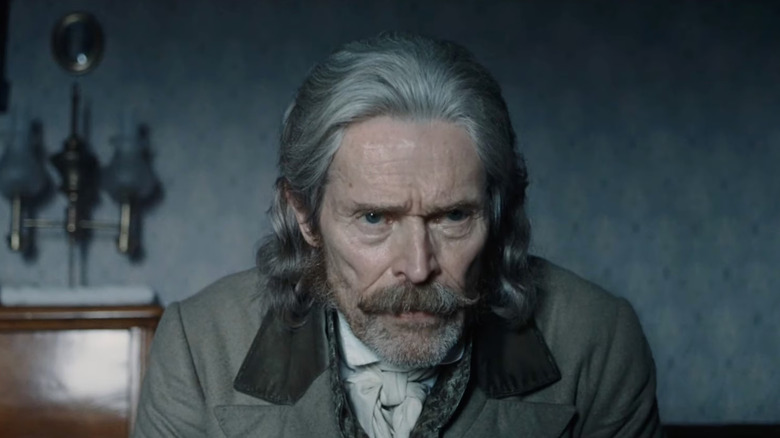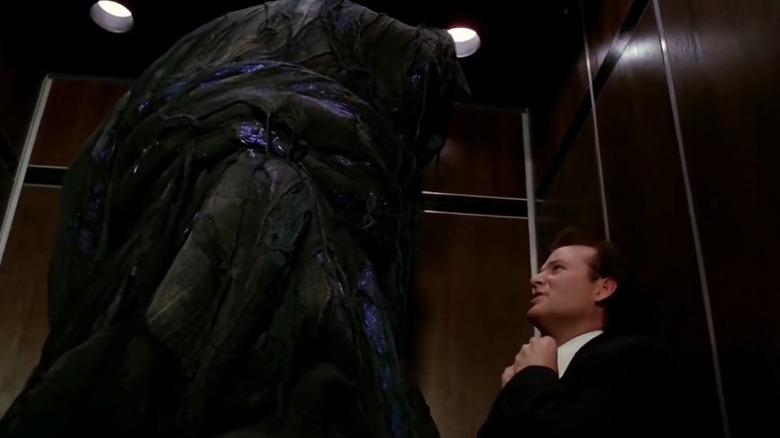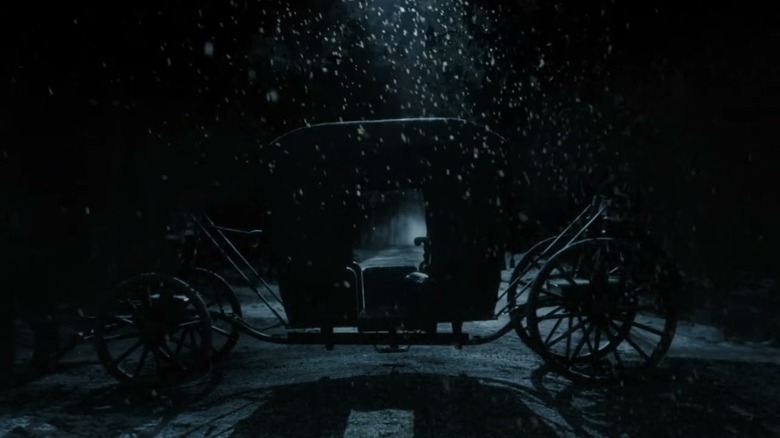Robert Eggers' A Christmas Carol Can Actually Capture What Most Adaptations Miss
Charles Dickens' immortal novella "A Christmas Carol" was published in 1843, a year firmly within the Victorian era. During that time, England saw the gulf between the classes — which had long existed, of course — grow even wider. The Industrial Revolution brought with it a great deal of progress and prosperity for those at the top of society, and allowed for the middle class to expand to a point of becoming a major cultural influence. Yet it left those at the bottom feeling their squalor more than ever. Dickens was moved to write his tale due to the plight of working-class children that he was observing firsthand, combined with the increasing popularity of the celebration of Christmas and its emphasis on charity during that season.
The author also had deeply personal reasons for telling a story about the nasty old miser Ebenezer Scrooge learning the error of his ways, for Dickens came from a middle-class family that found itself in trouble when his father, John, was committed to a debtors' prison in London when Charles was just 12 years old. As Dickens' tale of Scrooge has endured over the centuries, it's become diluted and homogenized through no fault of its own other than its sheer popularity. Very few of the numerous adaptations of the story forget the social and ethical power behind it, though some emphasize it more than others.
While it's generally been traditional to keep the story set in its original era, some adaptations have updated it to the modern day. The one aspect that many adaptations miss, regardless of their setting, is that "A Christmas Carol" is not merely a character study in which one singular man needs to be redeemed. Rather, it's a story about kindness overcoming capitalism, a tale of three spirits that gives way to an unseen yet deeply felt fourth: the spirit of giving. The fear inherent in the story — and "A Christmas Carol" is a horror story with ghosts, make no mistake — is less about not being liked, and more about how capitalism can rot away the souls of all humanity if we're not careful. With today's announcement (via Deadline) that Robert Eggers will be writing and directing a new film version of "A Christmas Carol," with Eggers' regular Willem Dafoe hopefully playing Scrooge, it seems we can look forward to an adaptation that will nail every aspect within Dickens' work.
'A Christmas Carol' is an all-ages ghost story best exemplified by its period setting
The most common mistake that pop culture has continually made about Dickens' novella is that it's a story for children, something to introduce them to as a way of instilling a sense of morality. While this isn't wrong per se, it's allowed "A Christmas Carol" to have its impact lessened in the way too much material intended for children often is. Not only is it a tale important for adults to consume (especially well-off adults), but it's also one that shouldn't be trivialized. As many fans of 1992's "The Muppet Christmas Carol" often say, even director Brian Henson and the folks behind the Muppets knew this, as Michael Caine's performance as Scrooge, along with the core tenets of Dickens' tale, is delivered with utter seriousness (in between the requisite bits of Muppet vaudeville, naturally). Eggers' filmography has thus far not been family-friendly in the slightest, so while it may be possible that his film of "A Christmas Carol" might tone down the violence and sexual content, it's likely not going to have the tone of a toy commercial, either.
What undoubtedly will be seen in Eggers' "Christmas Carol" is a remarkable attention paid to the period setting, something which is often overlooked in most adaptations. While it is possible to retain the power of the story while divorcing it from the Victorian era, it's become commonplace to see the tale told in a too-sanitized version of the 1840s, something which Richard Donner's still-underrated "Scrooged" made a clever, cynical meal of. Given that "A Christmas Carol" takes place just six years after Eggers' film of "Nosferatu," it's likely that the filmmaker was partially inspired to tackle Dickens' novella due to the wealth of research he completed while making that movie. So, one can look at the success of the period's portrayal in "Nosferatu" and be almost guaranteed to get a "Christmas Carol" just as richly realized.
Eggers will likely not let audiences forget that 'A Christmas Carol' is about the horror of inhumanity
Using "Nosferatu" as a point of comparison (mostly because Eggers' prior films were not strictly adaptations of pre-existing material), one of the most impressive elements of that movie was how it retained a great deal of the work of Bram Stoker and F.W. Murnau while incorporating as much of the mythos of the vampire from actual folklore as well as cinematic tradition. When it comes to the vampire character alone, Count Orlok (Bill Skarsgård) looks and sounds like a Solomonar, has the skin complexion of a corpse, and yet has an allure both romantic and grotesquely sexual. Eggers goes out of his way to include all those elements in the single character, demonstrating how he's not overlooking what's come before. In doing so, he pays homage to the past without merely being slavish to it, instead utilizing it in order to feel both accurate and fresh.
Because of this, Eggers will most likely not be overlooking the horror elements inherent within "A Christmas Carol." While Jacob Marley's visitation upon Scrooge is often portrayed as something inconvenient — likely a byproduct of people thinking it's too early in the story for Scrooge's character to be altered — this is still a man's dead colleague coming back from some hellish purgatory to bitterly warn him about how he's doomed. It's not friendly, and it's not pleasant; for my money, Frank Finlay's performance as the character in the 1984 film is as close to being as truly disturbing as it should. No doubt that Eggers will capitalize on this element and then some, and not merely leave the spooky content for the traditionally spooky Ghost of Christmas Yet to Come.
"A Christmas Carol," while certainly being a tender, thoughtful, and ultimately heartwarming story of opening one's heart to others, is also a tale about the horror of inhumanity. One could argue whether humanity's nature is inherently selfish or giving elsewhere; Dickens' story posits that true humanity lies in kindness, and capitalism is the death of the soul. Our collective souls have been wanting as of late, so I'm hopeful that Eggers will be the man to come along and scare some real sense back into us in the nick of time.


